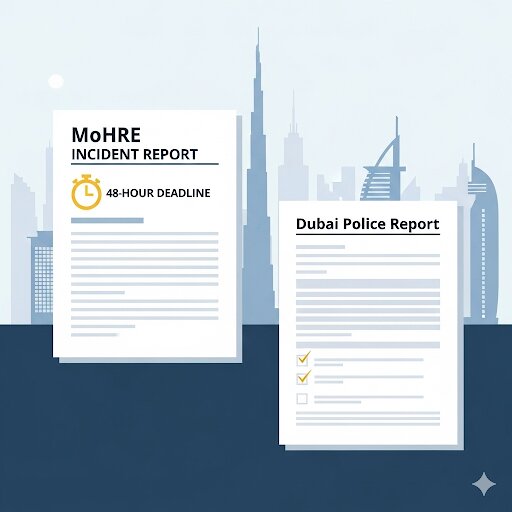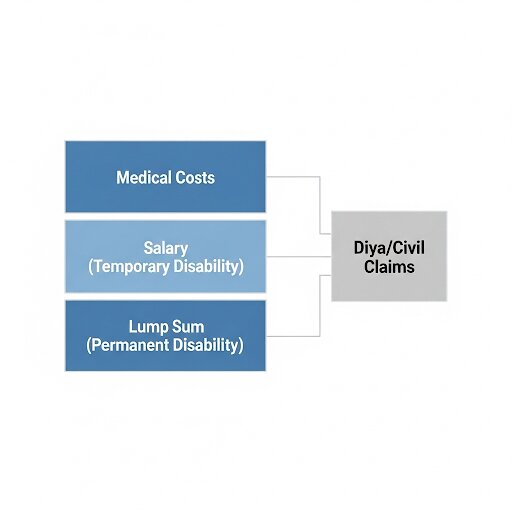Table of Contents
Introduction: A Guide for Employers
Immediate Actions After an Injury
- Provide Medical Assistance
- Secure the Scene
- Internal Notification
Official Reporting Requirements in Dubai
- Ministry of Human Resources and Emiratisation (MoHRE)
- Dubai Police
- Free Zone Specifics
Understanding Your Legal Compensation Liability
- Temporary Disability
- Permanent Disability
- Fatality, Diya, and Civil Claims
Can a Manager Be Held Personally Liable?
Assessing Your Insurance Coverage
- Workmen’s Compensation Insurance
- Employer’s Liability Insurance
Handling Compensation Disputes
Protecting Your Business and Your People
A workplace accident in Dubai can be a stressful and perplexing occasion for any organization. Beyond the immediate worry for your employee's well-being, a complicated set of legal obligations and reporting requirements is instantly activated. Navigating these requirements successfully is not simply a question of compliance; it's crucial for safeguarding your firm from large penalties, legal responsibility, and reputational harm.
This handbook addresses the most frequent issues organizations have, giving a clear, step-by-step structure for handling the aftermath of a work-related event in line with UAE rules as of September 2025.

What Should I Do Immediately After an Employee is Injured?
Your answer in the first hour is important. Focus on safety, care, and control.
Provide Medical Assistance: Your first and most critical job is to ensure the wounded employee gets quick and adequate medical treatment. This involves delivering first assistance on-site and organizing rapid transfer to a hospital or clinic. This commitment is paramount and must be prioritized above any administrative activity.
Secure the Scene: Immediately secure the area where the accident occurred. This avoids future injuries and, significantly, maintains the scene for formal inquiries by the police or the Ministry of Human Resources and Emiratisation (MoHRE). Altering the scene might be interpreted as an effort to conceal evidence of carelessness.

Internal Notification: Activate your company's internal incident response strategy. Immediately contact your designated Health and Safety Officer, HR department, and necessary senior management to ensure a coordinated and compliance response.
Who Must I Report a Work Injury To in Dubai?
The UAE government enforces strict, time-sensitive reporting obligations. Failure to comply results in automatic penalties.
For businesses operating on the Dubai mainland, you have a dual reporting duty:
Ministry of Human Resources and Emiratisation (MoHRE): You are legally required to report any injury that prevents an employee from working to MoHRE within 48 hours. This deadline is non-negotiable. You can report through the MoHRE call center or its "Salama" smart app.
> Failure to report within this timeframe results in a fine of AED 10,000 per incident.
Dubai Police: You must also report the incident to the police station in the jurisdiction where your business is located. The police will conduct their own investigation to determine if any criminal negligence was a factor.
It's important to note that free zones may have additional requirements. For example, companies in the Jebel Ali Free Zone (JAFZA) must also report to Trakhees-EHS, while those in the Dubai International Financial Centre (DIFC) follow the procedures set by the DIFC Authority.
How Much Compensation Am I Legally Required to Pay?
The financial liability for a work injury in Dubai extends far beyond medical bills. The Dubai labor law mandates specific compensation based on the injury's severity.
- Temporary Disability: If an employee is temporarily unable to work, you must pay their full salary for the first six months of treatment. If recovery takes longer, you must pay half their salary for the next six months.
- Permanent Disability: For a permanent injury, compensation is paid as a lump sum. The amount is calculated as a percentage of the employee's basic salary for 24 months, with a maximum payout of AED 200,000. The exact percentage is determined by an official medical committee.
- Fatality: In the tragic event of a fatality, your liability is twofold and cumulative:
- Statutory Compensation: The employee's legal heirs are entitled to compensation equal to 24 months of the employee's basic salary, capped at AED 200,000.
- Diya (Blood Money): Under UAE law, if negligence is proven, a separate payment of Diya, fixed at AED 200,000, is also required.
Furthermore, an employee or their family can file a separate civil lawsuit for "moral damages" (pain and suffering), which has no legal cap. Understanding the full scope of worker compensation in Dubai is vital for risk assessment, and consulting with legal experts can provide essential clarity. If you're facing a complex claim, the experienced professionals listed on Lawzana's platform can help you navigate your obligations.

Can a Manager Be Held Personally Liable for a Workplace Accident?
Yes. A prevalent misperception is that responsibility is restricted to the firm. However, the UAE Penal Code may hold individual managers personally accountable if their mistake or carelessness resulted in an accident or death.
If an inquiry shows that an accident was caused by a failure to provide sufficient safety equipment or training, the responsible management, whether it a site foreman, department head, or even the General management, might face personal criminal charges, including fines and jail. This increases the relevance of occupational safety in Dubai from a corporate policy problem to a matter of direct personal danger for the leadership team.
Is My Company's Standard Insurance Enough?
Relying solely on the mandatory Workmen's Compensation insurance is a high-risk strategy. A robust insurance plan should have two essential layers:
Workmen’s Compensation Insurance: This is a mandatory policy that covers the direct statutory liabilities under the Labour Law, such as medical costs, temporary disability wages, and the statutory compensation for permanent disability or death (up to AED 200,000).
Employer’s Liability Insurance: This is a crucial additional policy. It is designed to cover liabilities that fall outside the Labour Law, most importantly the AED 200,000 Diya payment and potentially unlimited awards for moral damages from a civil lawsuit.
Without Employer's Liability coverage, your business is self-insuring against its largest potential financial risks.
What If an Employee Disputes the Compensation?
If there is a disagreement over the claim, the dispute resolution process begins at MoHRE.
First, a complaint must be filed with the Ministry, which will attempt to mediate an amicable settlement within 14 days. A recent and significant change now empowers MoHRE to issue a final, binding decision on any dispute where the claim is for AED 50,000 or less.
For claims exceeding this amount that cannot be settled, MoHRE will refer the case to the UAE Labour Courts for a judicial ruling. Given the legal weight of these initial proceedings, it's wise to approach any MoHRE complaint with thorough preparation and legal advice.
Protecting Your Business and Your People
Responding to a workplace accident in Dubai requires a swift, systematic, and legally compliant approach. The keys to protecting your business are a proactive safety culture, a comprehensive insurance portfolio that goes beyond the mandatory minimums, and a clear understanding of your reporting duties.

The legal landscape is complex, and the consequences of a misstep can be severe. When an incident occurs, navigating the claims and potential disputes requires expertise. Lawzana connects businesses with vetted and experienced legal professionals who can provide critical guidance. To ensure your company is fully protected, consider connecting with one of the specialized work injury lawyers in Dubai.





